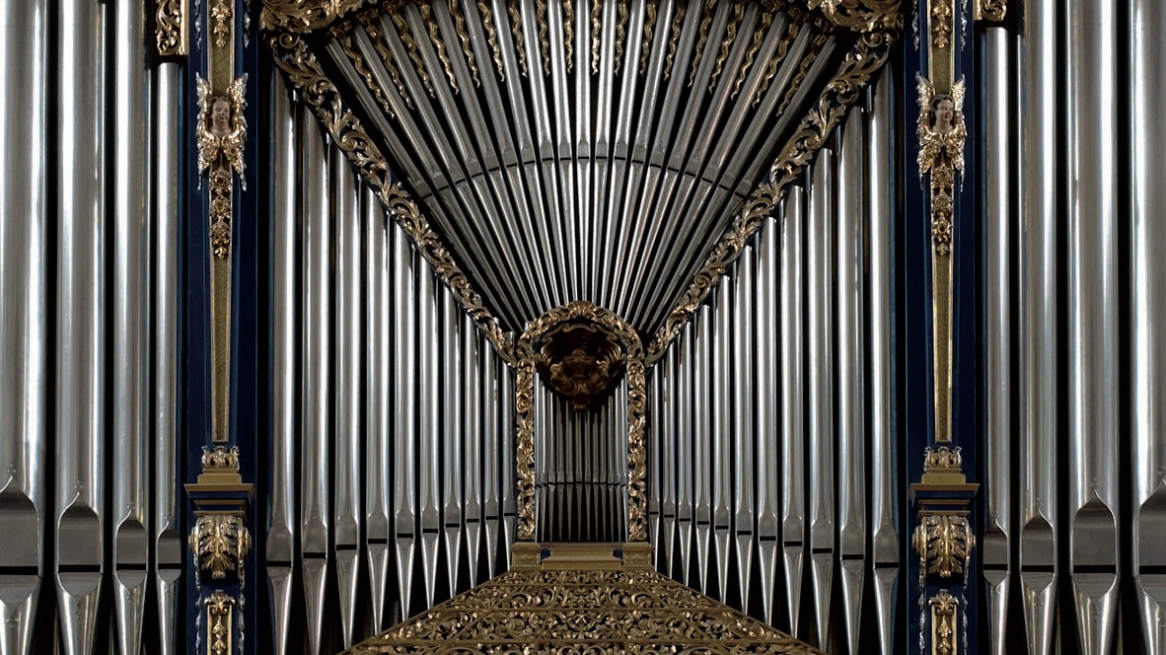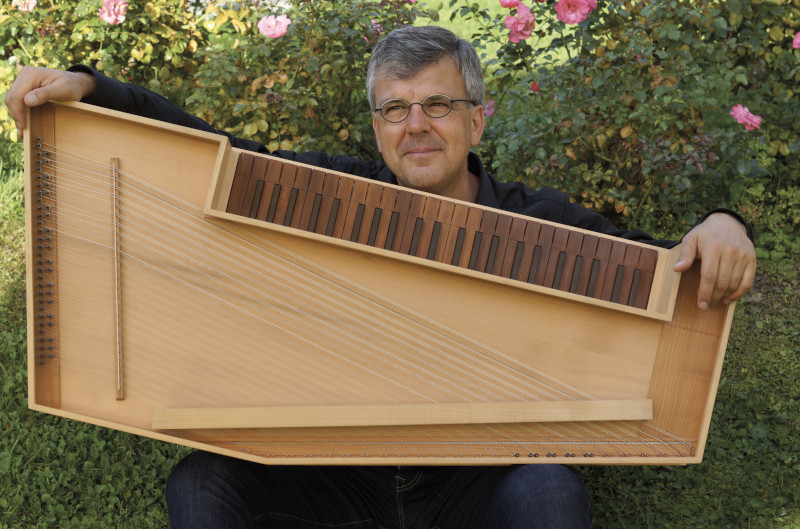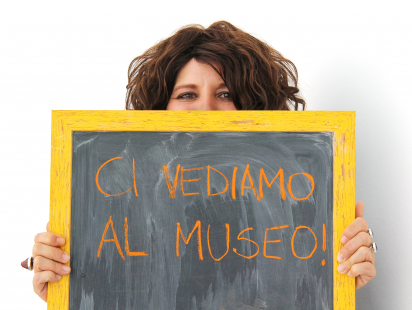
Innsbruck is a city of many things: of mountains, the cenotaph of Emperor Maximilian I, Zaha Hadid's ski jump and Christmas markets ... but did you know that Innsbruck is also a city of organs? In the concert folder „Orgelstadt Innsbruck“ I counted 16. Most of them are historical instruments, in various churches and abbeys in and around the city. And the rich concert program „Orgelstadt Innsbruck“, which runs from February to December, allows you to discover and hear them. About organs and early music, I spoke with Peter Waldner, one of the organizers of this festival. Peter Waldner is very busy on the early music front, but, having to introduce him, I would say that first and perhaps most of all Peter Waldner is a musician.
Peter Waldner, musician and keyboard instrument expert, among other things organizes the concert program „Orgelstadt Innsbruck“, Photo © Peter Waldner
AN INTERVIEW BETWEEN HARPSICHORDS AND CLAVICHORDS
Peter Waldner's apartment is a stone's throw from the Mariahilf church in Innsbruck, where he is serving as organist. For the interview he receives me in a room-a sort of "treasure chamber"-where we are not alone, but in the company of harpsichords, clavichords and a virginal.
Professor Waldner, there is a very rich and comprehensive biography on your website. However, I ask you to briefly tell us what you do in life ...
Peter Waldner: "Everything in my life has to do with music, especially with early music, music for organ and keyboard instruments. I am a professional musician, I teach harpsichord, organ and basso continuo at the Innsbruck Conservatory and Mozarteum, I am artistic director of the early music concert season ‚Innsbrucker Abendmusik‘, I give concerts and record CDs with period instruments. And I am organist at Mariahilf Parish in Innsbruck, where I play practically every weekend during church services."
Doyou have any free time left?
"Actually you have to see that there is also time left for other things, for private life, for relaxation. Music engages me a lot, because I want to take the time to prepare well. For a concert it's important to know the pieces really well and then be able to play them as if for the first time, as an improvisation, with presence and freshness."
Two harpsichords, copies of historical instruments, in the studio of musician Peter Waldner, Photo © Laura Manfredi
YOU NEVER FORGET YOUR FIRST LOVE
What was his first encounter with music?
"It was in the family. My parents were not professional musicians, but they both had a natural musicality. Mother sang in the church choir, played the guitar, the Zither, a typical instrument in the Tyrolean musical tradition, and sang with us children. And then I remember well the moment when I really heard the organ in the church for the first time. I was just a small child and they had explained to me how the organ worked. They had also shown me and explained the paintings in the church."
What church was it?
"The church in Malles in the Vinschgau Valley, a small town in South Tyrol, my hometown. My father's grandfather had been the model for the painting of God the Father in the church. He was a man with a very long beard!
These are my earliest church memories having to do with music."
When did you start studying music?
"When I was six years old, I started playing the accordion,Accordeon, with a musician. At that time there was no music school in the country, but there was this Italian gentleman, very good with the accordion, who played light music and popular music. And so I started with him. At the age of 11 - quite late - I started studying piano and organ. And I dreamed of learning to play the harpsichord. This was a dream even as a child. I had heard it on the radio and on some records we had at home."
How did you come to become an interpreter of music on period instruments?
"I moved to Innsbruck to study at the university. And I was studying keyboard instruments at the conservatory. My professor was Reinhard Jaud - still the organist of theEbert organ in the Hofkirche, the oldest organ in Austria, dated 1558. Under the influence of the very important renaissance and baroque instruments in Innsbruck, I became interested in early music, the renaissance repertoire, baroque, all the way to early romanticism. I have always been interested in playing and interpreting ancient repertoire on the 'right' instruments, period instruments."
The Ebert organ in Innsbruck's Court Church is the oldest organ in Austria, Photo © Alexander Haiden
KEYS WITH CENTURIES OF HISTORY
What fascinates you about historical instruments?
"It's so many details. For example, if we talk about the historic organs here in Innsbruck, they are organs with a mesotonic temperament. That alone is a very special thing."
You have to explain this one to me, because I don't know what a mesotonic temperament is...
"Mesotonic temperament is a system of tuning a keyboard instrument in a particular way, limited in the possibilities of tonalities, but with very expressive and intense chromaticity. And this is an extremely important feature for a lot of early music.
Or even the extension of the keyboard and the so-called short octave, the last octave for the left hand that is shorter than the other octaves. In short, there are so many details that make it easier for the organist when he has to play ancient repertoire.
And of course there is the sound: these organs still have the original pipes, with hundreds of years on their shoulders."
Do you ever think about how many musicians have played on these instruments?
"Yes! When I play on a historical harpsichord in a museum's collection-I'll be at the Unterlinden Museum in Colmar or Germanisches Nationalmuseum in Nuremberg, for example-the keys often have a recess. There you can see that I am just one of many colleagues who have played on these instruments over the centuries."
Keyboard instruments are small works of art and often have fine ornamentation, such as this harpsichord by Peter Waldner, Photo © Laura Manfredi
THE ORGAN: A MAJESTIC INVENTION
What is the appeal of the organ for you?
"The organ has a very long history, and there is no other instrument for which such a vast repertoire has been composed. It is a majestic invention, in which, with the different registers, the sounds of so many instruments are integrated and imitated. It is no accident that Mozart in a letter to his father calls it the king of instruments."
What about the appeal of music?
"Music is a universal language, it is the language of the soul, it is a communication that acts on an unconscious level. As a musician I work on the level of the soul. Think for example of a mother singing a song for her newborn baby: here music is an expression of emotion, of warmth, of love.
Music is a language that everyone can understand.
And the organ and organ music are able to convey a sense of sacredness-and I am not referring here to a specific religious denomination-that is very important on an existential level. In short, composers have written music that is good for the soul, real nourishment for the soul."
There are more than 60 organ concerts scheduled at „Orgelstadt Innsbruck“ for 2023, but if you want to hear Peter Waldner at the keyboard, don't miss the May 7 concert with Cecilia Bernardini on baroque violin in the parish church at Mariahilf.
USEFUL INFORMATION
Orgelstadt Innsbruck
2023 Concert Program
The concerts are held in various churches in and around Innsbruck.
Admission is sometimes free, sometimes free, and sometimes chargeable.
All details are in the program.
Header image: © ITV
Rate this article
Show me the location on the map
A visual artist from Milan who not only works with brushes and canvases but also loves writing about art, culture, music, design and creativity.
Similar articles
Innsbruck is really good at beauty! But where a building site is currently disrupting the…
Innsbruck is a popular tourist destination. The big attraction remains the mountains, but the city has a…
Not just looking at art, but getting to know it better on a guided tour, talking about…
The 'Path of the Senses' from Rietz via Stams to Mötz-Locherboden is an exploration in the…









